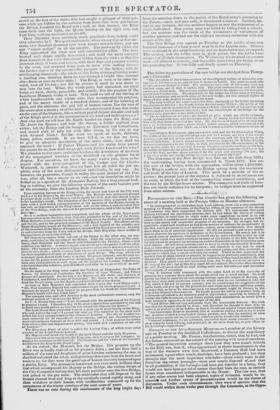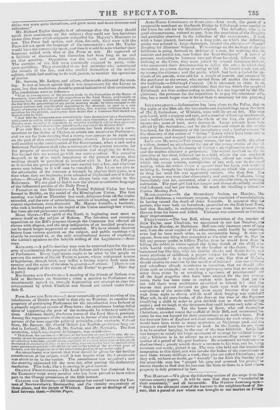" In consequence of an invitation from Lord Althorp, there
was a very numerous meeting on Monday afternoon, at the Foreign Office, of the members of the House of Commons who have supported the Reform Bill. We understand that Lord Althorp informed the gentlemen present, that he had taken the liberty of calling them together, in order that he might make some suggestions to them as to the course which it would be most expedient for the friends of Reform to pursue with a view to the speedy and successful progress of the measure. He strongly, but re- spectfully, urged such members as had given notices of motions for amendments in the Bill, not to persevere in such motions, unless, upon consideration, they should deem them to be of essential importance. He did not pretend to ask of an y gentle- man to abandon his opinions in deference to the Government. He merely put it to the good sense of members, whether it would not be more advisable to give up any objections which they might entertain to some of the details of the Bill, than to de- lay and retard its progress by bringing on endless discussions in the Committee upon such details. He was most anxious—and so must be every true friend of Reform— that as little delay as possible should occur ; and therefore it was that he urged gentlemen to sacrifice their feelings upon some minor points, and thus accelerate a measure to which they were all so deeply interested. Whilst he thus expressed his anxiety that all delay should be avoided, he begged to be distinctly understood, that the enemies of Reform were most miserably mistaken, if they hoped to defeat the Rill by delay. They might originate discussions from day to day, and throw obstacles in the .way of the Bill ; but of this they might all rest assured, thatrather than abandon the Bill, Parliament should be kept sitting until next December, or next December tweiremonth, if necessary. "Sir F. Burdett fully concurred with the noble Lord as to the necessity of pressing on a measure upon which the public mind was so much excited. He need hardly say that he entertained very strong feelings upon the subject of Reform, and that there n-ere some provisions which he would wish to see introduced into the Bill, which it did not at present contain ; but he would adopt the suggestion of the noble Lord, and give up for the present his own views upon these particular points, in order that, as far as he was concerned, no impediment might be thrown in the way of his Majesty's Government. He would accept the Bill in its present form, as a measure calculated to do immense good to the country; reserving to himself, of course, the right to suegest, at any future period, such amendments as would give a. more extensive operation to the principle of the Bill.
" Lord Milton differed very materially from the honourable Baronet. His wish was that the measure should be final ; and therefore he thought it their duty to make it so perfect in all its details, as that it should not require future amendment. "An honourable Member observed, that it would be endless work to try to moire any measure of such a complicated nature perfect; and that the working of time would always point out improvements, which might be beneficially adopted. "Several gentlemen, we are informed, expressed their warm concurrence in the view taken by Lord Althorp, and promised, as far as in them lay, to give effect to his Lordship's suggestions."
CONDUCT OF THE ANTI-REFORR MEHEERS.—A number of the Livery met on Tuesday at the Guildhall Coffeehouse, to discuss the expediency of a public meeting. Mr. Fearon, the chairman, stated, that he had, the clay before, conversed on the subject of the meeting with several members. "The general impression amongst them (and they were stanch friends to the Bill) was, that if, when appearances to throw impediments iu the way of the measure were first discovered, a Common Hall had been summoned, a good effect would, doubtless, have been produced ; but they thought that the most important schedules—those which went to dis- franchise the rotten boroughs—were now nearly disposed of, and that in all probability, if the boroughs had been put together in a lump, they would not have Leen got rid of sooner than had been the case, as certain forms were considered indispensable in the House. The fear was, that if any other course had been adopted, topics of irritation would be in. creased, and further causes of procrastination would be the theme of discussion. Under such circumstances, they were of opinion that the Bill would within three weeks pass through the Commons, as the Oppo.
Press did not speak the language of the community : now Mr. Taylor language tallied with that of the Press or not. He approved of
. a latitude of discussion, but discussion had been long at an end
the vermin of the law, and who availed themselves of the techni- the fear that the proceedings of any public meeting might, by those engaged in the immed:ately be held.
PASS TU L rr E BIL AS JrIT IS !—Or attention has been drawn by a come- offered for the discovery of the incendiary ; end a further reward spondent to the claims of Chelsea to return one member to Parliament; d.
and we are far from denying that a strong case appears to be made out on the part of that extensive and populma, district. It is certainly a case some persons, and dropped upon the praxises of others.
Put beyond. this we cannot go with our correse W ondent. e conceive despatch to be of so much importance at the present mcment, that nothing should be permitted to interfere with it. Let the Bill pass in milking cows ; and, pretending friendship, offered her some E as it is—let the great principle be once carried into alaw, and whatever errors may belong to it will soon be remedied. But let us not give to the adversaries of the measure a triumph by playing their game, at a time when they are beginning to be ashamed or frightened out of it them- to woman was soon after discovered ; and surgeon alleran,
selves.—Morning Herald. [This has always been our advice to the un H
Reformers. We are glad to find it now the almost unanimous language m Peonness oe rem Movenexas—A Trades' Political Union has been
formed in Dublin, on the model of the Birmingham Union. The first Carlow Morning Post.
attended, and the rate of subscription, periods of meeting, and other ne- cessary regulations, were discussed. Mr. Marcus Costello, a barrister, who took a leading part in the repeal of the Union meetings last winter, has been elected permanent president.
MORE Ihers.—The spirit of the North is beginning once more to
arouse itself on the subject of Reform. The frivolous and vexatious days' imprisonment. opposition to the Bill's progress through the Commons has affected all Exccueneies.—The boy Bell, whose conviction of the murder s classes with disgust, and the deep indignation of an insulted people can- not be much longer suppressed or concealed. We have already received hanged on Monday, at Maidstone. Bell was only fourteen years ofe; letters from various quarters on the subject, and public meetings will and, from the utter neglect of his education, could hardly be regal
shortly be resorted to, as the only constitutional means of expressingven had he been much older; as an accountable being. It does
the nation's opinions on the babyish trifling of the Legislature.—Scots-
man. felt any greater qualm in killing Taylor, than he would have done KIRKALDY. —A public meeting may soon be expected here for the pur-
pose of accelerating the progress of the Reform Bill through both Houses b of Parliament. Every legal means ought to be tried by the people to prevent the return of the old Tories to power, whose antiquated system of legislation, though brief, may inflict a lasting injury both upon the dissecting-knife? Is it required that our code, like that of Meies a,
country and the cause of freedom in general .—Scotsme n. [There is not the least danger of the return of " the old Tories" to power. Their day and schoolboys already murderers in intention, that we should ,e1ee.
is past.] them such an example ; or was it our grown-up men that we sought to Recites.= AND Cnernew.—A meeting of the friends of Reform was deter from crime by so revolting a specimen of punishment? Oe held at Rochester on Saturday ; when a petition to Parliament was all the legal tragedies that have been enacted for the last twete unanimously agreed to, strongly deprecating any attempeto alter the years, there has been none so replete with horror. And yet arrangement by which Chatham and Stroud are united under Sche- are told there were multitudes assembled to behold it ! And ti:* dule E. masses that pressed forward to glut their eyes with the expising



























 Previous page
Previous page